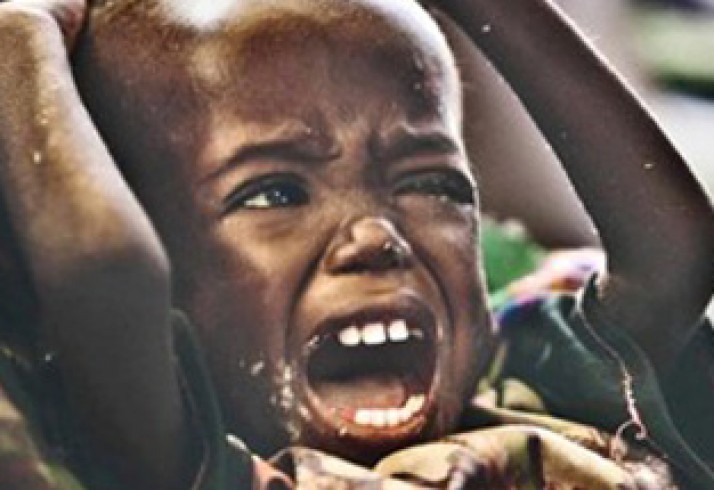“Feed the World’. No, wait, save it from Ebola.”
Any child of the Eighties has the original BandAid and its image of Africa indelibly imprinted on their minds: a riverless world under a burning sun, where it never snows or rains, where tiny children’s bellies swell horribly and flies settle on skin as cracked and dry as the land. For many, particularly those of us who grew up in little Welsh villages, replacing that intensely powerful but homogenous and one-sided image of ‘Africa’ with more knowledge and nuance will have taken years. But for many more it’s an image that will never have been truly shaken.
Among this group of people are the thousands of compassionate women (they are very likely to be women) who will buy the latest reincarnation of BandAid’s ‘Do They Know Its Christmas?’ and put it in their children’s stockings this year. (Discounting One Direction fans, who are really too young to remember BandAid).
But the decision to resurrect this song, with tweaked lyrics, has received plenty of criticism from press and social media - for everything from its patronising lyrics, to the lack of African artists in the line-up. Reaction to BandAid30 and its frankly weird #E30LA has been mixed to say the least.
One of the reasons for this is surely that part of the ‘legend’ of the original BandAid is the legacy of perceived corruption that shrouds it. Thirty years on, in countless focus groups and interviews, I’ve heard people trace back their lack of trust in aid and overseas charity to the apparently unanswered questions about ‘where that money went’. The sense of betrayal seems very real still, as does the damage to development charities’ reputation as a whole. Latest figures from NCVO put the proportion of UK charity donors giving regularly ‘overseas’ at just 14%, a 3% drop even from the last count in 2012. This small group of donors accounts for 10% of total donations to charity overall, suggesting a very particular demographic giving to this kind of cause.
This makes the major defence of the project really interesting and complex. Much of the counter-criticism seems to be along the lines of, ‘hey, it’s for charity people, shut up and give your money for the nice song’. Although in actual fact, Bob Geldof himself has admitted he doesn’t care what you think about the music: “It really doesn’t matter if you don’t like this song…what you have to do is buy this thing” (as opposed to downloading it free or cheaply). In other words, just give us your f***ing money.
His comments suggest that he knows the song is a powerful signifier. BandAid = human devastation in Africa. Anyone older than 20 knows what it means (it became a Christmas Carol in primary schools up and down the country). Most charity advertising is designed to short-cut the rational to go straight to the emotion. This, by contrast, seems designed to short-cut the emotional and go straight to the wallet via deeply ingrained cultural memory.
Geldof is reported as saying: “[BandAid30] is focussed on a small part of Africa that potentially holds a vast danger to the world.” The message is basically, ‘look guys, there’s no time to produce art or even tug on your heart strings with something new. It’s Africa, right? It’s the same as it always was, right? Only this time there’s a threat for us too… so let’s bloody get on with it.’
Perhaps this isn’t fair. Midge Ure is reported in the Telegraph as saying: “There was something in the air 30 years ago that you could touch, that you could feel,” he said. “People wanted to help. We want that again.”
What’s difficult to appreciate from these musicians’ standpoint is that the cultural legacy of BandAid, the ‘flies in the eyes’ way in which development charities have reached out to UK givers over the last three decades, is precisely what may make it increasingly difficult to generate that authentic, spontaneous, trusting outpouring now and in future. The Bond report initiated by Oxfam flagged this up in 2011, and the limited mobilisation in response to last year’s IF campaign seems to underline the point.
So it’s hard not to view BandAid30 ultimately as a potential set-back for development and overseas charities as a group. The 14% who already give to overseas charities have a more complex view than that peddled by the BandAid crew. They will already be giving to their charity of choice, or be one of those who have helped DEC raise £10 million for tackling this disease. People give for all sorts of reasons, but those who buy this record will feel they ‘should’, out of their humanity, maybe also out of fear. But they will probably retain their reservations about overseas giving per se. Between the fearful swirling blood of current DEC appeals and this vaguely threatening but ‘same as it ever was’ call to action by BandAid, it’s doubtful that charities will swell their ranks of loyal direct-debiters to actually tackle the systemic problems that have made Ebola such a terrifying problem.
Desperate times call for desperate measures? The UN apparently called Geldof and the wheeled out response does feel a bit desperate.
An understandably frustrated columnist has written in the Guardian: "Why does the red emergency telephone go for charity, over joined-up inter-governmental action?” I think the answer is simple, if depressing. Because it’s quicker. Because it will raise money that’s badly needed. We don’t live in an ideal world. And communicating complex messages is hard. In an emergency, we all prioritise the short-term over the long-term. It’s a measure of how grave the situation is that this song is rearing its head again.
But I’ll be fascinated to see what happens. Will BandAid30 raise more or less overall than direct donations to charity? How many people will respond to its lack-lustre appeal? The response to this song will be an interesting indicator of how many more BandAids are feasible before the sticking plaster really comes unstuck and we’re actually forced to turn to harder to achieve more long-term, and long-lasting solutions.






